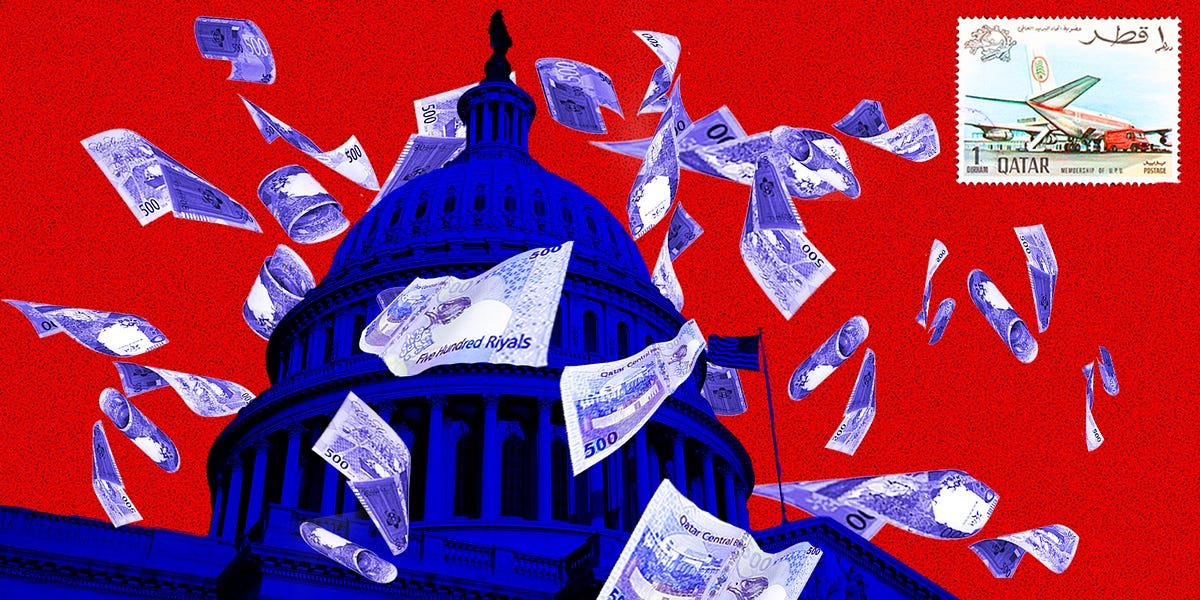On Wednesday, Donald Trump will travel to Qatar. On his trip, the president will visit Al Udeid Air Base, the largest American military facility in the region, and attend meetings with the ruling Al Thani family. Perhaps he will also thank them for the $400 million gift of a luxury Boeing 747-8 jumbo jet that will reportedly be retrofitted for his use, and then transferred to his presidential library.
The airplane deal was signed off by Attorney General Pam Bondi. She used to work at a Washington, D.C., lobbying firm that received $115,000 a month from Qatar to fight human trafficking, according to a 2019 contract reviewed by The Free Press.
She’s not the only one in the administration with ties to the Persian Gulf state.
President Trump’s chief of staff, Susie Wiles, led lobbying firm Mercury Public Affairs when it represented Qatar’s embassy in Washington. FBI Director Kash Patel worked as a consultant for Qatar, though he didn’t register as a foreign agent.
And then there is Steve Witkoff, president Trump’s longtime friend and senior adviser, who is accompanying him on his trip this week. For months now, Witkoff has served as Trump’s special envoy to the Middle East—and his name has been floated as a future national security adviser. Witkoff also happens to be a beneficiary of Qatar’s largesse: In 2023, Qatar’s sovereign wealth fund bought out his faltering investment in New York’s Park Lane Hotel for $623 million.
Meanwhile, the Trump Organization is hard at work planning a new luxury golf resort near Qatar’s capital, Doha, in partnership with a Qatari company. Trump’s son Donald Trump Jr. will speak next week at the invitation-only Qatar Economic Forum in a session titled “Investing in America.”
If you were just a casual reader of these facts—an ordinary American who doesn’t think much about the Middle East after America’s traumatic wars of the 2000s—you would think Qatar is a top American ally, a trustworthy partner, and a key hub of international commerce—a country in good enough standing that the president of the United States would use its plane as Air Force One.
But Qatar is also a seat of the Muslim Brotherhood, a crucial source of financing to Hamas, a diplomatic and energy partner of Iran, a refuge for the Taliban’s exiled political leadership, financier and cheerleader of Palestinian terrorism, and the chief propagandist of Islamism through its media powerhouse, Al Jazeera, which reaches 430 million people in more than 150 countries.
Key members of Qatar’s royal family have made their admiration for Islamism—and Hamas specifically—very clear. Sheikha Moza bint Nasser, the mother of Qatar’s emir and the chairperson of an educational nonprofit funneling millions into American schools, praised the mastermind of the October 7, 2023 massacre, Yahya Sinwar: “He will live on,” she wrote on X after his death last year, “and they will be gone.”
The question is: How did a refuge of Islamist radicalism, a country criticized for modern-day slave labor, become the center of global politics and commerce? How did this tiny peninsular country of 300,000 citizens and millions of noncitizen migrant workers manage to put itself smack-dab in the center of global diplomacy—and so successfully ingratiate itself within the Trump administration?
Over the past few months, The Free Press investigated these questions. What we found is that no obstacle, no history, no bad headline is too big for Qatar’s money.
No posts
How Qatar Bought America – by Frannie Block and Jay Solomon – The Free Press



